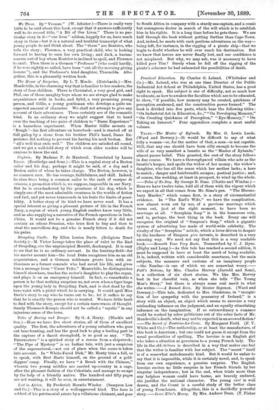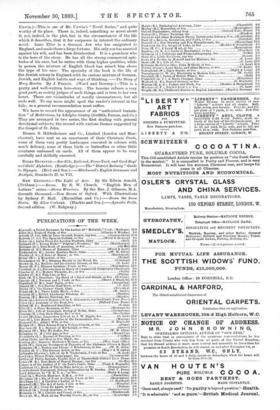TALES.—The Master of Rylands. By Mrs. G. Lewis Leeds. (Ward
and Downey.)—It would be difficult to say of what folly a woman—or, for the matter of that, a man—is not capable. Still, that any one should have been silly enough to become the wife of so very manifest a lunatic as the "Master of Rylands," almost passes belief. This granted, the rest of the story follows in due course. We have a thoroughpaced villain who acts as the lunatic's keeper, and spoils the widow of her money; the widow's daughter, who has all the sense which her mother lacks; a hero to match ; danger and hairbreadth escapes ; poetical justice ; and, of course, the wedding, at least in prospect, to wind up the whole. —Tales of To-Day. By George R. Sims. (Chat-to and Windus.) — Here we have twelve tales, told all of them with the vigour which we expect in all that comes from Mr. Siras's pen. "The Blooms- bury Murder," which comes first, is a story of circumstantial evidence. In "The Earl's Wife," we have the complication, now almost worn out by use, of a previous marriage which turns out, just at the right moment, to have been no marriage at all. "Seraphim Soap" is in the humorous vein, and is, perhaps, the best thing in the book. Every one will recognise the original of " Simpson's Soap," which a gigantic system of advertising has made of world-wide celebrity. The rivalry of the " Seraphim " article, which a lover driven to despair by the hardness of Simpson pere invents, is described in a very amusing way. We need not say that this is a very readable book.—Beneath Your Very Boots. Transcribed by C. J. Hyne. (Digby and Long.)—As this tale has reached a second edition, it must be supposed to have at least the merit of being readable. It is, indeed, written with considerable smartness, but the main subjects, the manners and customs of an imaginary people —the Nandas—is one of which we are somewhat weary.— Putt's Notions, by Mrs. Charles Hervey (Jerrold and Sons), is a collection of six short stories. We like Mrs. Hervey best in her cheerful vein, as when she tells "The Young Man's Story," but there is always some real merit in what she writes.—A Ruined Race. By Hester Sigenon. (Ward and Downey.)—This tale, dedicated to Mrs. Gladstone, in "recogni- tion of her sympathy with the peasantry of Ireland," is a story with an object, an object which seems to exercise a very misleading influence on the judgment, and an equally stimulating influence on the imagination. If so extraordinary a romance could be worked by sober politicians out of the sober facts of Mr. Mandeville's death, what may not be expected in an avowed fiction ? —The Secret of Fontaine-La-Croix. By Margaret Field. (F. V. White and Co.)—The authorship, or at least the manufacture, of this book is American ; but one could not guess it except from the usual peculiarities of spelling. The heroine is an English girl who takes a situation as governess to a young French lady. The life in the old chateau is described in a way that makes one feel that the writer is familiar with her subject. The " secret " itself is of a somewhat melodramatic kind. But it would be unfair to say that it is impossible, while it is certainly novel, and, to speak from our own experience, a genuine surprise. The English heroine excites no little surprise in her French friends by her singular independence ; but in the end, when trials more than any helpless woman could have borne, are bravely endured, she justifies the national character. The young cure is well drawn, and the Count is a careful study of the better class of young Frenchmen. Altogether, this is a decidedly powerful story.—Isaac'Eller's Money. By Mrs. Andrew Dean. (T. Fisher ljnwin.)—This is one of Mr. ITnwin's "Novel Series," and quite worthy of its place. There is, indeed, something so novel about it, nct, indeed, in the plot, but in the circumstances of the life which it describes, that it far surpasses in interest the ordinary novel. Isaac Eller is a German Jew who has emigrated to England, and made there a large fortune. His only son has married against his will, and has been disinherited. It is a grandson who is the hero of the story. He has all the strong commercial apti- tudes of his race, but he unites with them higher qualities, while in person the mixture of English blood has raised him above the type of his race. The specialty of the book is the life of the Jewish colony in England,with its curious mixture of German, Jewish, and English habits and ways of thinking. —The Story of Mary Herries. By J. Francis. (Ward and Downey.)—This is a pretty and well-written love-story. The heroine refuses a very good parti, as society judges of such things, and is true to her own heart. There are vicissitudes of wordly circumstances, but all ends well. To say more might spoil the reader's interest in the tale; so a general recommendation must suffice.
We have to record the appearance of an "authorised transla- tion" of Meditations, by Adolphe Gratry (Griffith, Farran, and Co.) 'They are arranged in two series, the first dealing with general devotional subjects, the second with various themes suggested by the Gospel of St. John.
Messrs. S. Hildesheimer and Co., Limited (London and Man- chester), have sent us an assortment of their Christmas Cards, some of them very pretty landscapes executed in colours with much delicacy, some of them birds or butterflies or other little creatures embossed on cards. All of them appear to be very carefully and skilfully executed.







































 Previous page
Previous page